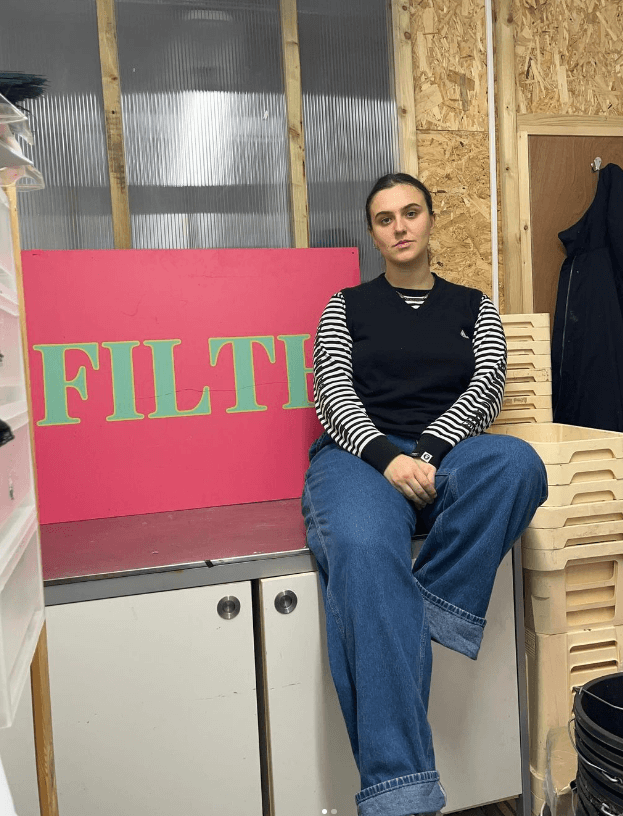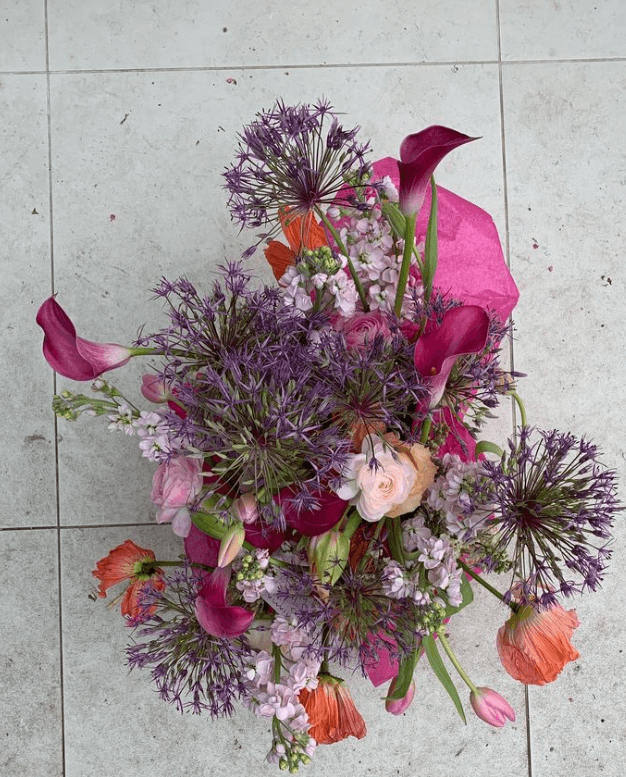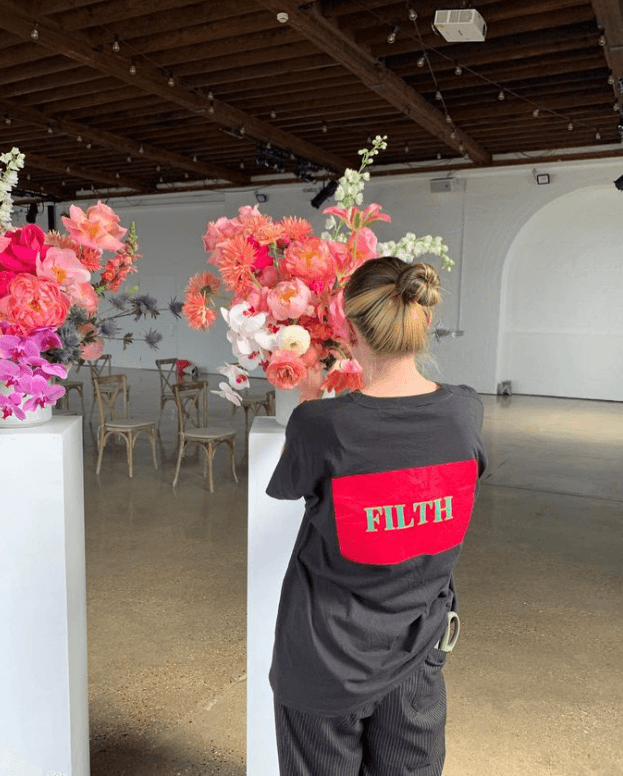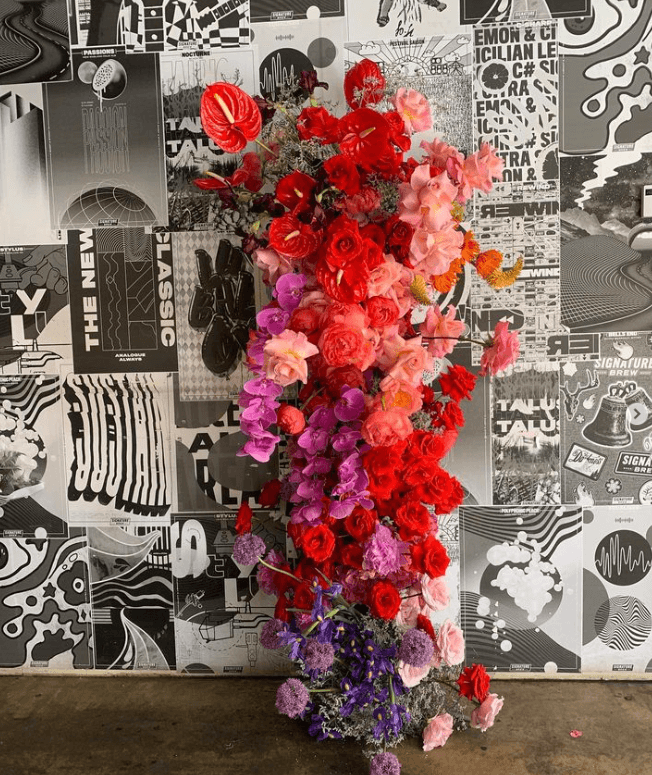Wake up and smell the roses with Filth Florist
To celebrate February, the month of love, Bionic chatted with Rosy Sida, who runs Filth Florist in London. We found out about the natural progression of her business and how it has morphed into something super special over the years.
“I'm Rosy and I’m the director of Filth Florist,” Rosy tells us, brightly “We’re a flower studio based in South East London, but we work all across the UK.”

So, the million-pound question, how exactly is Filth different to other florists? What makes them blossom and bloom, stand out from the crowd? Rosy says the effort and delicate care she puts into each arrangement is key, but she also ensures all her work comes with her own personal touch too. She goes out of her way to produce unique offerings and is always looking to insert creativity into her work.
“We're a bespoke studio,” She tells us “So, every single piece of work we create is completely unique, we don't do anything by cookie-cutter standards. We supply weddings and events, but our work is essentially floristry that performs as artwork too.” She explains.
Rosy told us that her business initially launched during Covid, but what started as a hobby evolved into a fully-fledged company she is immensely proud of.
“The business is three years old now, we started during the second lockdown.” She tells us, excitedly “I wouldn't have started Filth without Covid happening. I was unemployed during that time, like lots of people, and my mum is a florist, so I was kind of trained to know the basics.” She went on “I set up Filth with the view that I’d start delivering weekly bouquets around London to begin with, I had nothing to lose and the fact that everyone was on their phone so much really benefited me, certainly in the beginning.”
Rosy said she saw a real boom in people wanting to send floral arrangements to the loved ones they were separated from due to lockdown, and her business became popular, fast.
“I accrued a fair number of followers” she recalls “at that point people’s disposable income wasn't being spent on going to the pub or going out. But lots of people were sending bouquets to friends and family.”
Buds of positivity
And how has the business changed over the last three years? Rosy says that although she loved crafting the unique bouquets, her focus has shifted.

“The business has changed quite a lot. When I first started it obviously there were no weddings or events, and I was just doing the weekly bouquets” She explains “But over the last three years we’ve pretty much become just a wedding and event studio,” She says “We do Valentine's Day and Mother's Day flowers, that kind of thing, but weddings are our main focus.”
The business is still flourishing though, and Rosy is happy with the route it’s taken, it allows her to flex her creative skills even more so and get stuck into wedding themes and alternative designs. But if she could pick just one thing, what would Rosy’s biggest achievement be?
“I think my biggest achievement is just building a business which is sustainable and actually works as a business” She laughs “That’s probably a really obvious thing to say, but building a business that works is a really difficult thing to do.”
She adds “But also I got my first proper studio in December, which was a huge move for me. Having staff members is a big achievement too, just hitting all those big milestones!”
And what about the other side of the coin? The struggles? Has Rosy faced her share of obstacles in her time? She nods. “Oh, there’s been so many and there will be so many more!” She answers, smiling “One struggle has been the cost of flowers increasing dramatically. That was because of Covid, the energy crisis and the cost of living crisis.” She explains “Trying to communicate the increase in price to people is not easy either.”
She continues "Another struggle has been dealing with quiet periods. I think all small businesses go through peaks and troughs, but especially since becoming a wedding and event florist, we have really busy periods and then really quiet periods.” She ponders “For example, January was pretty quiet. I think financially and psychologically managing those big shifts in pace is really difficult”.
So, how exactly does Rosy cope with these slower months?
“Because we're now a wedding and events studio, I'm working to really long timelines." She tells us "The winter months consist of consultation meetings with clients for the following year, I just try to really capitalize on the time that I have. So then in the summer when we're delivering work, I'm not super stressed about having to do lots of meetings.”
She mentioned the cost of living crisis and the energy price crisis, so Bionic asked if Rosy needed to adapt her business in any way to survive. She says yes.
“Moving to the wedding side of business and not doing the weekly bouquets was a direct result of the increase in flower costs.” She tells us “I would probably still be doing the bouquets if flowers hadn’t increased so much in price, but the margins are just so small now, it's not a financially viable income stream.”

And what is her favourite part about running Filth? Rosy says being her own boss is something she really thrives in, she loves having creative control, but the fact she can organise her own time is something that appeals to her.
“My favourite part about running a business is actually just working for myself and being able to manage my time how I want” She grins “The freedom you get from that is huge. Obviously, there are downsides to not having a salary. But I’ve been able to build something sustainable that speaks to part of my personality.”
And how does Rosy keep motivation at an all-time high? Does she have regular staff she employs, how does she inspire them daily if they’re having an off day?
“I have a pool of freelancers,” Rosy says “and we’re a very close working team. I have three core people who I trained myself. So, we are all extremely close. I work hard to create a work environment that’s loving and supportive. I think there’s less of a chance for dips in motivation because we all get on so well.”
Building a brand
What is Rosy most excited about for the future? Does Filth plan to expand or meander into other forms of events? Maybe Rosy wants to put on more workshops or hire more freelancers.
“I used to do more workshops than I do now.” Rosy says “So there's some of that planned this year. The wedding side of the business is pretty well established now. At the minute, I'm working on building the brand up. I want to do more set design and brand activation stuff, angle towards beauty and fashion.”
And speaking of brand work, does social media help Rosy advertise her business? Or would she say she uses more traditional forms of marketing? She ponders before answering.

“When I first started, Instagram and social media was how I built my platform, basically for free. It does work as free advertising, so it definitely built our following.” She tells us, adding “But I do get a lot of work through word of mouth which is something I like. A lot of people say it's interesting, even in this age of technology, with endless visual media at our disposal, I still get a lot of work through recommendations."
She continues “I mean, obviously I love Instagram and it's a vital tool for me. But It’s still really nice when I get an email from someone being like ‘Oh, I know this person they mentioned you’ It’s a really nice feeling.”
And why should we all be shopping small now more than ever? What sets Filth apart from supermarket bunches?
“I think this is a huge conversation that we've seen especially since Covid. There was a real shift towards thinking about where our money goes. I think with businesses like mine, the customer is investing in a belief in creativity and craftsmanship.” Rosy explains “When they buy something, they’re acknowledging a more transparent chain of spending money, they understand where their money is going and they’re making a choice to say ‘this is worth it’”.
She goes on "I mean, the supermarket flower thing is difficult. I have nothing against Lidl tulips, they’re in my house all the time. They have a purpose and that's great. But with Filth, it’s about the kind of flowers that we source, the hours we spend designing, creating and thinking. You know, for me personally, it’s the hours that I'll spend sitting on my sofa at night being like, ‘oh, there's that wedding coming up. What if we did this?’”
“That's all part of what you pay for, it’s the work of love that maybe Lidl can't offer in the same way." She finishes.
With this in mind, if Rosy could go back to the start of her set up journey, would she change anything? She considers the question for a moment, before answering.
"I think- and this is something that I'm still learning to do-but I’d want to trust the process a bit more. And actually, if it doesn't go the way I want, to be happy that at least I gave it a go. I know a lot of small businesses who ran during the pandemic and then for whatever reason, stopped." She recalls, adding "That is not a failure, these businesses gave it a good go, they put something into the world that was completely them, which is really, really brave.”
And finally, Bionic was curious to uncover what advice Rosy would give to another business owner just starting out. Her answer was a brutally honest one.
“When you start a business, people will give you advice left, right and centre, often unsolicited” She grins “My advice would be ‘you don't have to listen’”.
She continues “I think you’ll know your business best and obviously there’s a time and place to ask people for advice, people will dish it out like there's no tomorrow, the bottom line is you don't have to listen if you don’t want to!”
You can check out Rosy's impressive floral arrangement work on Instagram or via the Filth website.




